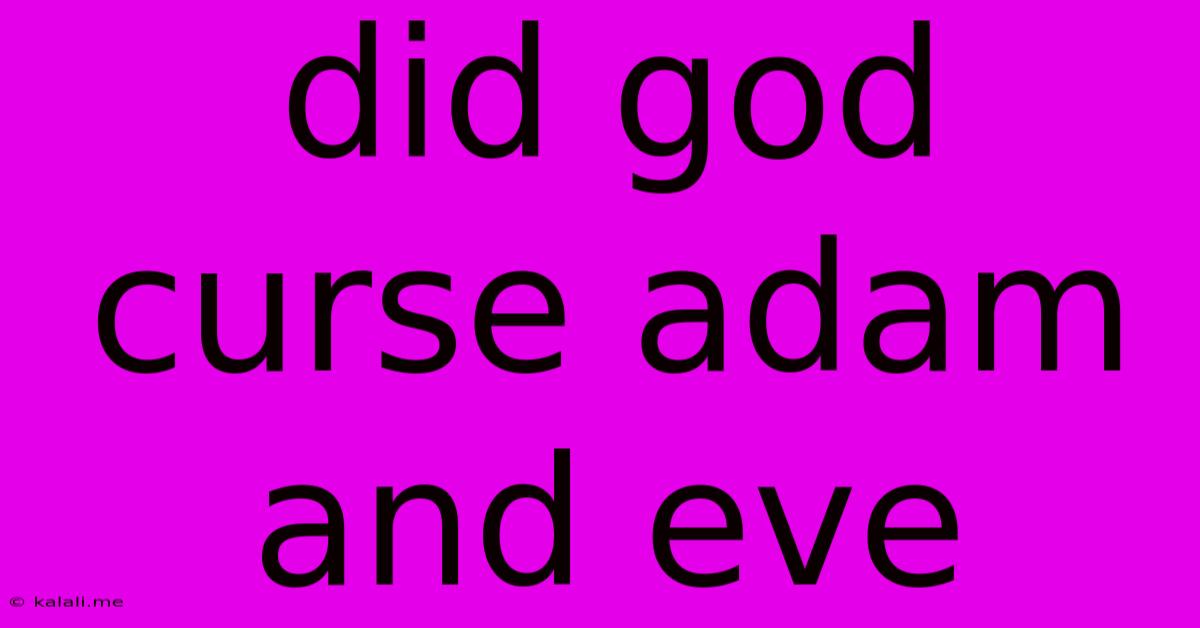Did God Curse Adam And Eve
Kalali
Jun 01, 2025 · 3 min read

Table of Contents
Did God Curse Adam and Eve? Exploring the Genesis Narrative
The question of whether God cursed Adam and Eve is a central theme in Christian theology and a frequent point of discussion among religious scholars and casual readers alike. Understanding the nuances of the Genesis narrative requires careful consideration of the text's literary style, historical context, and theological interpretations. This article explores the events in Genesis 3, examining the consequences of their actions and the nature of God's pronouncements.
The Serpent's Deception and the Fall: The story unfolds in Genesis chapter 3, depicting the temptation of Adam and Eve by a serpent. This serpent, often interpreted as Satan or a demonic entity, convinces Eve to disobey God's command not to eat from the tree of the knowledge of good and evil. Eve, in turn, persuades Adam to join her. This act of disobedience, often referred to as the "Fall," sets in motion a series of consequences.
God's pronouncements: Curse or consequence? The text then describes God's interaction with the now-disobedient couple. Many interpret God's words as curses, highlighting the negative consequences faced by Adam, Eve, and the serpent. However, it's crucial to analyze the specific pronouncements to understand their nature.
Consequences for the Serpent:
- Crawling on its belly: God's statement regarding the serpent’s future movement is often seen as a punishment, altering its physical form and mode of locomotion. This change, however, could also be interpreted as a description of the serpent's natural state, emphasizing the disruption of the original harmony.
Consequences for Eve:
- Pain in childbirth: The increased pain associated with childbirth is highlighted as a consequence of Eve’s disobedience. This is often seen as a direct punishment, emphasizing the physical toll of sin.
- Subjection to her husband: The statement about Eve's subjection to her husband is often interpreted as a curse, establishing a hierarchical relationship. However, some scholars argue it reflects the existing social dynamics of the time, rather than a divine imposition.
Consequences for Adam:
- Toil in labor: The increased difficulty of agricultural work is presented as a result of Adam’s disobedience. This hardship mirrors the physical challenges faced by humanity throughout history.
- Relationship with the Earth: The earth’s resistance to Adam’s efforts in agriculture is another consequence. This mirrors the challenges of survival that humanity has faced ever since.
The broader context: It's important to note that the narrative in Genesis 3 uses figurative language and symbolic imagery. The "curse" itself isn't a simple act of divine retribution, but rather a depiction of the broken relationship between God and humanity, and the subsequent changes in the created order. The consequences outlined are not necessarily eternal punishments, but rather the natural effects of choosing disobedience over obedience to God's will.
Interpretations and theological perspectives: Different theological perspectives interpret the events in Genesis 3 differently. Some emphasize the severity of God's judgment, highlighting the lasting effects of sin on humanity. Others focus on God's grace and mercy, emphasizing the eventual redemption offered through Christ. The concept of original sin and its implications for human nature are deeply intertwined with these interpretations.
Conclusion: Whether one interprets God's pronouncements as curses or consequences, the narrative in Genesis 3 powerfully conveys the consequences of choosing to disobey God. The text highlights the brokenness that entered the world through this act of disobedience, impacting humanity's relationship with God, with each other, and with the natural world. The story invites reflection on the nature of free will, the consequences of our choices, and the enduring hope for restoration and redemption. Understanding the nuances of this ancient text requires careful consideration of its literary style, historical context, and the diverse theological perspectives that engage with it.
Latest Posts
Latest Posts
-
Love The Sinner Hate The Sin
Jun 02, 2025
-
Can Yo Uchange Spells When Leveling Up 5e
Jun 02, 2025
-
Two Lines Intersecting At A Right Angle
Jun 02, 2025
-
How To Make Blender Render No Shading
Jun 02, 2025
-
Yelling On The Job Is Considered
Jun 02, 2025
Related Post
Thank you for visiting our website which covers about Did God Curse Adam And Eve . We hope the information provided has been useful to you. Feel free to contact us if you have any questions or need further assistance. See you next time and don't miss to bookmark.